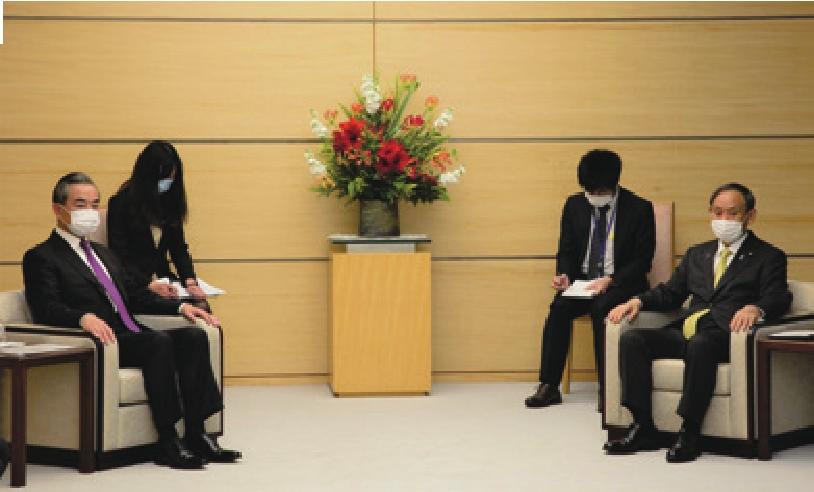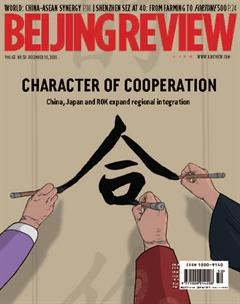MOVING FORWARD
By Shi Yongming

After thousands of years of evolu- tion from individual struggles for existence, human civilization is at another historic crossroads today: whether to propel competition into confrontation, or establish a social ecology of cooperation.
What distinguishes civilization from barbarism is not the capacity for material productivity but the capacity to build symbiotic societies. The future lies in peoples perceptions and the choices they make.
The novel coronavirus disease pandemic is an example. While it has shown that joint efforts are needed to face the crisis, some politicians in certain Western countries have tried to use it as a handle to further divide the world. Against this backdrop, Chinese State Councilor and Foreign Minister Wang Yis recent visit to Japan and the Republic of Korea (ROK) was a diplomatic initiative to promote cooperation and symbiosis in East Asia.
Positive signs
Wangs visit followed the signing of the Regional Comprehensive Economic Partnership (RCEP) by 15 Asia-Pacific economies. When globalization is receding and politicians in the worlds only superpower, the United States, are pushing for a new cold war, economic fragmentation and political confrontation, the new partnership shows that although we now live in a more divided world, the call for forging synergy still has its supporters.Progress in regional cooperation has been pronounced in East Asia, which has enjoyed more rapid development than other regions. However, partnerships within the region took time to develop due to the gaps between its different economies and their political and cultural pluralism, as well as external countries attempts to restrain regional progress.
Previously, the idea was to develop trilateral ties among China, the ROK, and Japan first and expand the momentum to the rest of the region. But in practice, due to historical factors and geopolitics, trilateral relations did not always progress smoothly and the free trade agreement negotiations between the three have still not seen a breakthrough.
However, the RCEP broke through the bottleneck and ushered in a new stage of regional cooperation.
Shared responsibilities
China-Japan relations have been in a trough in recent years due to problems left over from history as well as differences in understanding the future world.Over the past two years, though Japanese politicians have shown restraint on personally visiting the Yasukuni Shrine, there has been no substantial change in their attitude toward historical issues. The shrine honors 14 Class-A convicted Japanese war criminals and is a source of diplomatic friction with neighboring countries that regard it as a symbol of Japans military past.
Another thorny issue left over from Japans invasion of China, the Diaoyu Islands dispute, has always remained on the table. In June, Japan “renamed” the islands, which belong to China, and also reached an agreement with the United States to further intervene in the dispute. This was followed by Japanese fishing boats repeatedly entering the waters off the Diaoyu Islands.
The impasse between Japan and the ROK over Japans use of forced labor during World War II and forcing girls and women into sex slavery, leading to the offensive term “comfort women,” has also affected China-Japan relations.
Wang made three proposals during his Japan visit on the issue of the Diaoyu Islands. First, the two countries should abide by the four-point principled consensus reached in 2014 to stabilize their relationship. These points are aimed at pursuing mutually beneficial relationship based on common strategic interests; squarely facing history and advancing toward the future; preventing deterioration of the situation in the East China Sea through dialogue, consultation and a crisis management mechanism; and resuming bilateral dialogue in various areas.
The other two proposals are that they should avoid taking action in sensitive waters that may complicate the situation; and if there are problems, they should communicate in a timely manner and deal with them properly.
Wang said the East China Sea should serve the fundamental and long-term interests of both. But Japans stance on the issue seems to be unrelenting, indicating the Diaoyu Islands will continue to plague bilateral ties for a long time to come.
Wang also discussed international and regional issues of common interest. He highlighted the shared responsibilities of the two nations to promote regional prosperity and stability and maintain lasting peace in the international community.
“Under the new circumstances, China is ready to work with Japan to shoulder responsibilities and promote cooperation with a broader vision and more effective actions, and in a wider range of fields, to bring more benefits to the two peoples as well as the international community,” he said.
A new stage
The relationship between China and the ROK is historically significant. The establishment of their diplomatic ties in 1992 was a symbol signaling the end of the Cold War in the region.Since then, China-ROK relations, though impacted by geopolitical factors, have been driven by cooperation and mutual benefit. Despite ups and downs, the overall ties have remained positive and healthy. The new cold war strategy adopted by the U.S. did trigger some antiChina noise in the ROK, but the leaders of the two countries have decided to focus on the future.
During his meeting with Wang, ROK President Moon Jae In said the ROK looks forward to deepening cooperation with China in various fields, promoting regional economic integration, jointly overcoming climate change and other global challenges, and pushing for greater progress in the bilateral relations in the next 30 years.
In 2022, when they celebrate the 30th anniversary of their diplomatic ties, deeper bilateral and multilateral cooperation is on the cards. The ROKs development strategies may see greater docking with the Belt and Road Initiative, a Northeast Asia cooperation mechanism may be in place for health and pandemic prevention, and greater understanding reached on a political settlement of the Korean Peninsula issue.
Consensus for the Future
Chinese State Councilor and Foreign Minister Wang Yis trip to Japan and the ROK on November 24-27 produced a series of agreements.China and Japan have agreed to
l follow the spirit of regarding each other as partners rather than threats, enhance mutual trust and engage in positive interactions to build bilateral relations that meet the requirements of the new era;
l continue to jointly fight the pandemic, exchange information in a timely manner, carry out medical and drug cooperation, safeguard the health of their people and make joint contributions to regional and international public health cooperation;
l work together to promote economic recovery, hold a new round of high-level economic dialogue at an appropriate time next year, and continue to strengthen cooperation in key areas such as scientific and technological innovation, energy conservation and environmental protection, medical care and health care, e-commerce and third-party markets;
l seek early enforcement of the RCEP, accelerate negotiations on the China-Japan-ROK free trade area and the regional cooperation, and jointly uphold and strengthen the rulesbased multilateral trading system;
l support each other in hosting the Tokyo Olympic Games and the Olympic and Paralympic Winter Games Beijing 2022 and make these two major sports events a success;
l hold a meeting of the highlevel consultation mechanism on people-to-people exchanges at an appropriate time, fully resume the mutual flow of personnel when the pandemic is over, expand local exchanges and cooperation, enhance mutual understanding and friendship between their people, and improve the public opinion environment for bilateral relations.
China and the ROK have stressed:
l strengthening joint prevention and control of the novel coronavirus disease, improving and expanding the application of the fast track for necessary personnel exchanges and promoting a Northeast Asian cooperation mechanism on health and pandemic prevention;
l establishing a committee for future development of China-ROK relations and planning for developing the bilateral ties for the next 30 years;
l launching the China-ROK 2+2 dialogue on diplomatic security, launching the China-ROK dialogue on marine affairs and holding a new round of high-level strategic dialogue between their foreign ministries to enhance diplomatic security and mutual trust, and promote cooperation in marine affairs;
l launching arrangements for the China-ROK Cultural Exchange Year in 2021 and 2022 and making preparations for celebrating the 30th anniversary of the establishment of diplomatic ties;
l accelerating the synergy of the Belt and Road Initiative with the ROKs development strategies, promoting cooperation in third-party markets, strengthening cooperation in key areas such as emerging industries and deepening high-quality integrated development of the two countries;
l concluding the second phase of the ChinaROK free trade agreement as soon as possible and issuing the Joint Plan for China-ROK Economic and Trade Cooperation (2021-25) at an early date to create better conditions for bilateral economic and trade cooperation;
l supporting each other in hosting the Olympic and Paralympic Winter Games Beijing 2022 and the Gangwon Winter Youth Olympics and stepping up people-to-people exchanges after the pandemic is under effective control;
l working together to maintain peace and stability on the Korean Peninsula and advancing the political settlement process of the Korean Peninsula issue;
l working jointly for the RCEP coming into force early, safeguarding multilateralism and free trade, promoting building an open world economy and jointly tackling global challenges such as climate change.
(Source: Ministry of Foreign Affairs)

